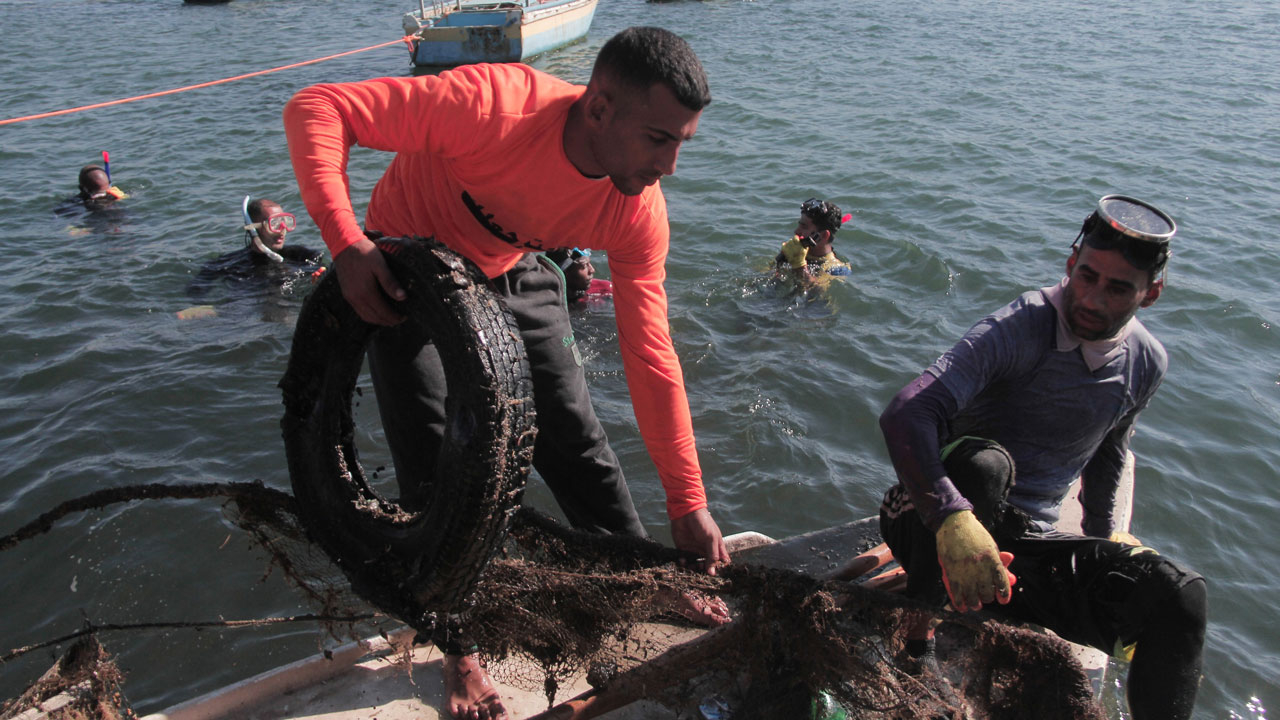
Pollution
13:05, 05-Dec-2018
Gaza sinking in polluted seawater and untreated sewage
Updated
12:16, 08-Dec-2018
By Khaled Alashqar

Hundreds of Palestinian young men and women in the Gaza Strip on Tuesday formed the largest human chain in what extended for dozens of meters along Gaza's sole seaport.
The initiative, entitled "It will come back to you," was part of a campaign aimed at protecting the basin of the Gaza harbor from growing levels of pollution due to the accumulation of large amounts of solid waste on the shore and under water.
Shireen Abu Zayed, 25, had her own reasons for volunteering in the campaign.

Sherine Abu Zayed is one of the volunteers in the initiative "It will come back to you" to protect the port of Gaza from pollution. /CGTN Photo
Sherine Abu Zayed is one of the volunteers in the initiative "It will come back to you" to protect the port of Gaza from pollution. /CGTN Photo
"Gaza harbor is the only outlet for residents here, unfortunately Gaza beaches are piled high with waste which threatens humans and fish," she said.
"We must try as much as possible to reduce pollution levels, and clean up the harbor with the little available capabilities that we have."
Sports teams, fishermen and divers also participated in the clean-up event. The divers jumped into the basin below the harbor and collected as much solid waste as possible.
Consultant of Water and Environmental Issues at the Environmental Quality Authority in Gaza and one of the campaign supervisors Ahmad Hilles confirmed that there are no strategic plans which would offer immediate solutions for protecting the sea from pollution.

Dr. Ahmed Hilles, water and environmental issues consultant and supervisor of the "It will come back to you" initiative, delivers a speech. /CGTN Photo
Dr. Ahmed Hilles, water and environmental issues consultant and supervisor of the "It will come back to you" initiative, delivers a speech. /CGTN Photo
Hilles blamed the situation on Israel and its blockade which deprives Gaza from building waste recycling plants to get rid of the accumulating waste pumped into the sea every day.
"We organized this initiative to encourage people here to take part in waste collecting activities, because we lack the capabilities and the tools to do so," he said.
The official explained that pollution in Gaza has reached unprecedented levels which can't be ignored.
Hilles also pointed out that there are tonnes of plastic debris scattered across the Gaza Strip.

Participants in the "It will come back to you" initiative to protect the Gaza port from pollution. /CGTN Photo
Participants in the "It will come back to you" initiative to protect the Gaza port from pollution. /CGTN Photo
Solid waste and untreated sewage in Gaza pose a huge threat to the environment, due to the strip's small size and its large population. According to the Palestinian Central Bureau of Statistics, over two million people live in an area smaller than 365 square kilometers in Gaza.
Moreover, the lengthy power cuts in Gaza have increased the level of pollution resulting from the poorly treated sewage being released into the sea. Some 110,000 cubic liters of untreated sewage are pumped into the Mediterranean on a daily basis, according to local authorities.
Furthermore, banning the entry of fuel and spare parts for water and sewage treatment stations has aggravated the problem, and disrupted the operation of the sewage treatment facilities.

Palestinian youth participate in the "It will come back to you" initiative to protect the Gaza port from pollution. /CGTN Photo
Palestinian youth participate in the "It will come back to you" initiative to protect the Gaza port from pollution. /CGTN Photo
Director-general of water and sanitation at Gaza municipality Maher Salem told CGTN that the Gaza sea is facing a catastrophic crisis due to the release of more than 70 percent of untreated sewage into the Mediterranean every day, which has made the waters unsuitable for swimming.
With no solution looming in the horizon, the accumulation of solid waste in landfills in residential communities in Gaza has made its burning the only way for getting rid of it. The black clouds of smoke rising from these burning operations have been named as a major cause for air pollution and the spread of respiratory diseases among residents.

SITEMAP
Copyright © 2018 CGTN. Beijing ICP prepared NO.16065310-3
Copyright © 2018 CGTN. Beijing ICP prepared NO.16065310-3